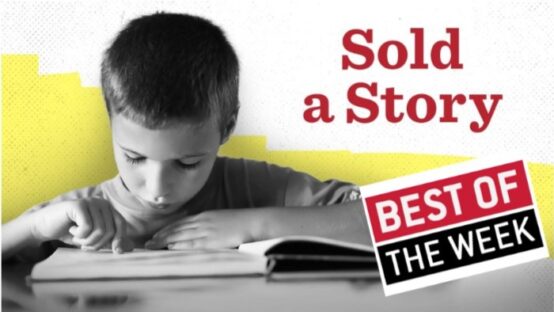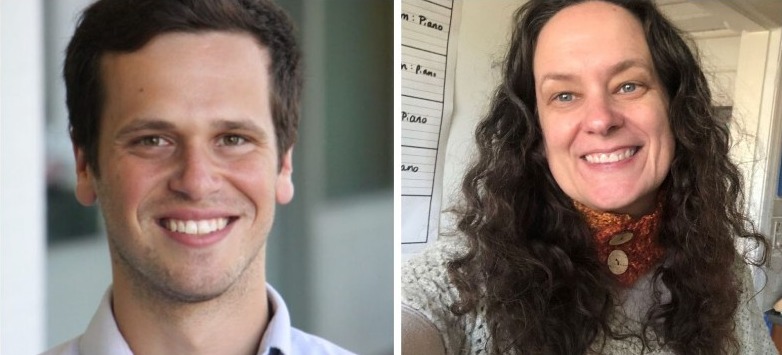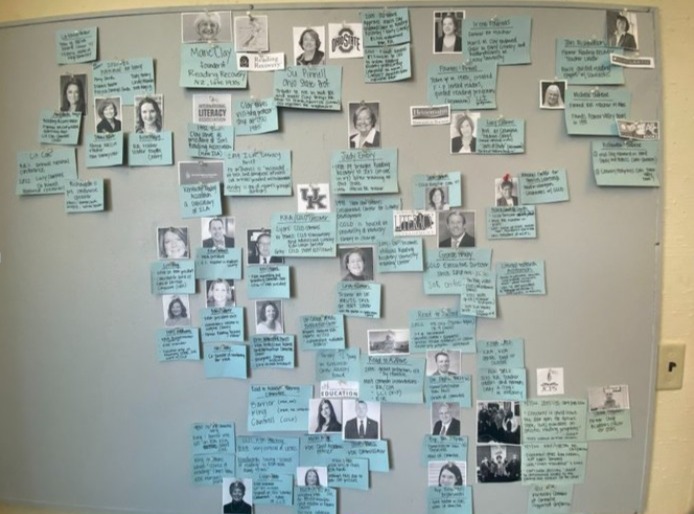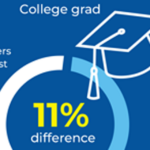In this week’s newsletter: APM Reports produces a much-admired new series on flawed reading instruction. Former education reporters describe why they left the beat — and what they missed while on the job. Chalkbeat is recognized for its many accomplishments. And a Louisville Courier Journal reporter credits her Homeland-style wall map for helping produce a blockbuster new series.
‘A RECKONING’
The big story of the week, according to us
The big education story of the week is the reconsideration of reading instruction that’s taking place in several states, districts, and schools around the country — thanks in large part to media coverage including this week’s efforts from APM Reports’ Emily Hanford and the Courier-Journal’s Mandy McLaren.
Much work remains to be done, and there’s the possibility that the effort will be watered down, delayed, blocked, overly focused on phonics and dyslexia, or — my latest fear — politicized by elected officials or conflict-prone journalists, as has happened in the past. But for now at least, the progress is happening. And journalism has played a small but important role.
“There’s a reckoning going on,” says APM Reports’ Hanford. “It doesn’t just include authors and educators. It includes journalists.”
Other big K-12 education stories of the week: A California ed school says it won’t send student teachers to a local school district that has banned CRT. There were some teacher strikes in Malden and Haverhill, Massachusetts. Three weeks after Hurricane Ian, most Florida kids are back in school.

SOLD A STORY/BETWEEN THE LINES
The best education journalism of the week, according to us
🏆 BEST: The best education journalism of the week goes to the first two episodes of APM Reports’ six-part reading series Sold A Story, describing the dismal situation too many kids and parents are in — and how we got here. My favorite moment is the opening scene in Episode 1, in which you hear a young reader struggle to read. But there are many others. “I was unsure Hanford could top ‘Hard Words,’” tweeted The 74’s Beth Hawkins. “But ‘Sold a Story’ is heartbreaking, enraging journalism at its damning best.”
🏆 RUNNER-UP: The runner-up for best education story of the week goes to the Courier-Journal’s five-part Between the Lines series by Mandy McLaren, which details how Kentucky kids are being left behind other states like Mississippi because of a stubborn resistance to changing reading instruction practices and the opposition of teachers unions and others who favor weak state regulations and local control. The demoralized kids and ashamed parents will move you. The excuse-making, politics, and bureaucratic fuckery will enrage you. EdWeek’s Sarah Schwartz called it “meticulous and devastating.”
BONUS:
🏆 COVID’s online school hurt kids’ test scores. Some adults regret it. (AP)
🏆 Why are students missing so much school? (Chalkbeat)
🏆 Seeking stability in school when the waters rise (Hechinger Report)
🏆 Alabama schools increasingly rely on emergency certified teachers (AL.com)
🏆 Did 80% of students miss fewer than 10 days of class during pandemic? (MST)
🏆 How Arizona schools are grappling with a teacher shortage (AZ Central)
🏆 They said letting transgender girls play would drive athletes away from sports – it didn’t (The 74)

‘I MISSED IT, TOO’
New commentary from The Grade
Above: Former WHYY education reporter Avi Wolfman-Arent (left) and former AJC education reporter Patti Ghezzi.
We put out two important pieces this week focused on the firsthand experiences of former education reporters. Both of them include what I can only describe as stunningly candid, vulnerable moments.
First, former WHYY Philadelphia education reporter Avi Wolfman-Arent (above left) describes the ambivalence and frustration that led him to leave the beat and become a full-time radio host. “I felt in myself a dangerous amount of sympathy for the decisionmakers,” Wolfman-Arent told me, referring to the much-maligned Philadelphia school system.
His frustrations and ambivalence are eye-opening and provocative to read — and his experiences are likely shared by other education reporters.
Then, former Atlanta Journal Constitution education reporter Patti Ghezzi (above right) describes how she missed the phonics story because of her bias against the approach and her unwillingness to question why so many kids weren’t learning to read, in partnership with the Atlanta Journal-Constitution’s Maureen Downey. Ghezzi and her own child learned to read easily, and she loved the idea of balanced literacy classrooms. But she missed the larger story: “If balanced literacy was the right approach, why were so many kids reading so poorly?”
The Oregonian’s Betsy Hammond pushed back, recalling that as an AJC reporter during the 1990s she was “allowed and encouraged to do tough coverage of non-science-based approaches.” However, at least one other education reporter admitted to having overlooked the reading story for many years: “I missed it too,” writes APM Reports’ Emily Hanford.
EXTRA TIME, STUDENT SUPPORTS
Promising innovations & signs of progress
💡 New program helps North Carolina school adjust to in-person learning (NBC News)
💡 Rural Teacher Prep Program Delivers ‘Job-Embedded’ Degrees — For $75 a Month (The 74)
💡 One Alabama town’s creative approach to teaching English to kids of immigrants (AL.com)
💡 How One School Is Beating the Odds in Math, the Pandemic’s Hardest-Hit Subject (NYT)
💡 Students, teachers praise Black, Latino studies course in mandate’s first year (Hartford Courant)
💡 New support teams aim to meet student needs, prevent trouble (Minneapolis Star Tribune)
PEOPLE, RESOURCES
Who’s doing what, going where
🔥 New follows: Here are some journalists I’ve followed recently: Rose Wong (@rosebwong) covers early childhood education for The Oregonian. Natalie Schwartz (@nmschwartz23) writes about ed tech, online education and for-profits for HigherEdDive. James Pollard (@PamesJollard) is an AP reporter covering inequality and state government in South Carolina. Elizabeth Sander (@eliz_sander) covers education for the San Antonio Express News. Ian Hodgson (@IanJHodgson) covers education at the Tampa Bay Times. Colin Hogan (@by_ColinHogan) is an education-focused journalist at the New Bedford Light.
🔥 Thought leaders: FairTest’s Akil Bello detailed misreporting of the latest ACT test score results, which he describes as a function of fewer test takers not diminished skills. Rutgers’ Carla Murphy gave a thought-provoking interview about reorganizing journalism so that it’s written for the communities being covered (not about them). NBC News’ Tyler Kingkade got to the bottom of the school litter box conspiracy theory so you don’t have to. Chalkbeat Philadelphia bureau chief Johann Calhoun was named one of the Washington Post/Poynter Institute’s 2022 leadership diversity fellows.
🔥 Jobs: The Courier-Journal’s Olivia Krauth is moving from education to the politics beat. Krista Johnson is coming back to the beat. Former LA School Report editor Laura Greanias is joining the Seattle Times as deputy investigations editor. Still no news on the Boston Globe’s replacement for reporter Bianca Vázquez Toness or NPR’s replacement for correspondent Anya Kamenetz (or even if there is going to be one). Meanwhile, Chalkbeat is hiring a temporary national reporter and KUOW Puget Sound Public Radio is hiring an education reporter.
🔥 Congrats again to Chalkbeat, the local education news network that was recently honored in a PBS documentary series featuring journalists Patrick Wall, Kolby Levin, and Lori Higgins. Chalkbeat’s head Elizabeth Green told viewers that there are now roughly 70 folks on staff and a 60-city waiting list for new Chalkbeat bureaus. Co-founder Alan Gottlieb, who originally launched EdNews Colorado but left Chalkbeat in 2015, appeared at the end of last night’s viewing party as if from the mists of time. Good to see you, Alan!
PODCASTS, EVENTS
What’s happening and new research
⏰ Appearances: The 74’s Beth Hawkins gave a talk at @IRE_NICAR #DBEI22 about “making newsrooms LGBT-affirming, source-auditing, collaborating to change journalism’s culture, [&] telling better, truer stories.” Longtime WBEZ Chicago reporter Sarah Karp and former NPR reporter Anya Kamenetz talked about how the pandemic affected children and the childcare system. The 74’s Kevin Mahnken hosted a discussion among school leaders about education politics and the midterm elections. The New York Times’ The Daily featured Daniel Bergner’s ‘Daring to Speak Up About Race in a Divided School District’. Frequent education writer Amanda Ripley talked about polarization and journalists becoming “conflict entrepreneurs” at PIE22 and at Grantmakers for Education. (The Hechinger Report’s Liz Willen was also there.)
⏰ Resources: Teach Plus and others held a webinar on newcomer immigrant students, migration, and safe + healing classrooms. Free Press has a new explainer featuring 7 tips for journalists from restorative-justice practitioners including the reminder to “stop pretending that we’re the smartest observers in the room or somehow uniquely attuned to people’s motivations and inner lives.” The Education Writers Association hosted an event on covering NAEP (which comes out next week). The organization also has a new explainer out, How to Cover Indigenous Students Authentically and Accurately. And, in honor of the upcoming midterms, let’s remember November 2018’s overblown narrative (in which “record numbers” of educators were said to be running for office).
⏰ Upcoming: The next ResearchED conference is taking place on October 22nd, featuring writers Karin Chenoweth and Natalie Wexler. AEI is hosting a postelection event on what the 2022 midterms will mean for early childhood education, K–12 schooling, and higher education. The deadline for the next crop of Spencer Education Journalism fellows is February 1, but it’s not too early to start dreaming up your big project now. (Speaking of which, former Spencer Fellow Kyle Spencer’s latest book “Raising Them Right” is just out.)
THE KICKER

“I did what any stereotypical investigative reporter would do,” explains Mandy McLaren in a thread about her amazing Between The Lines series.
ABOUT THE AUTHOR

The Grade
Launched in 2015, The Grade is a journalist-run effort to encourage high-quality coverage of K-12 education issues.














